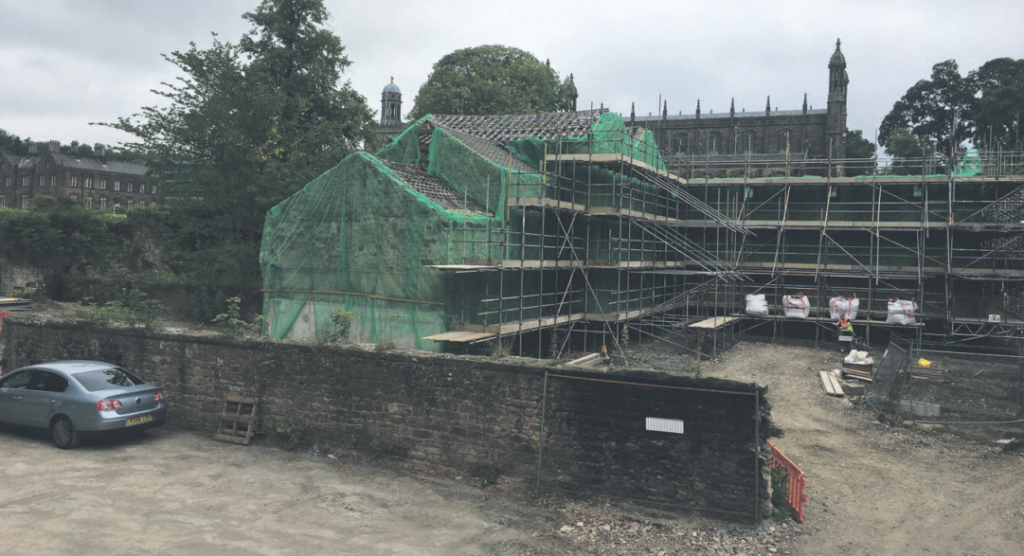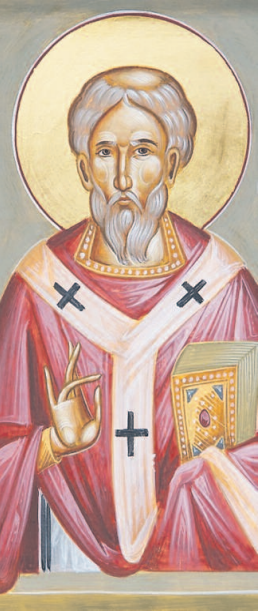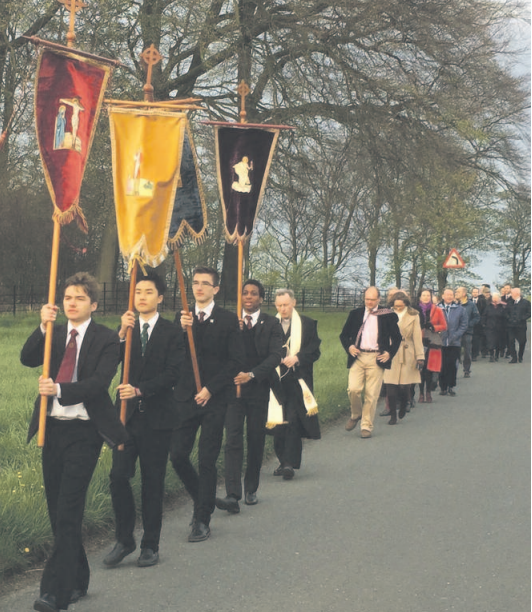Friday 1st September 2017
College hopes Theodore House will be God’s gift to the faith in England
St Theodore of Tarsus, whose feast day is celebrated on 19th September, holds a special place in the hearts of Catholics, Orthodox and Anglicans. Born in Syria, he lived between 602 AD and 690 AD and was Archbishop of Canterbury from 668 AD until his death.
Derived from both Latin and Greek, the name Theodore means ‘God’s gift’ – and, as St Theodore’s feast day approaches, the trustees of the Christian Heritage Centre at Stonyhurst have been reflecting on both God’s generous providence and the life of a man who proved to be such a gift to English Christianity.
Perhaps best known for the way he reformed the Church in England, and for the priority which he gave to education, Theodore was a Syrian Christian of Byzantine descent, who was forced to flee from Tarsus, when it fell to Islam. His own story is especially poignant as today’s Syrian Christians face their own Calvary of genocide, sustained persecution and flight to unknown lands.
His story reminds us of the ever-present challenge of persecution and the exodus of the Middle East’s Christians fleeing Syria and Iraq.
St Theodore studied theology, medicine, Roman Civil Law, Greek rhetoric and philosophy, Latin literature (both secular and ecclesiastical), astronomy and mathematics in Antioch, Constantinople and Rome. He was the embodiment of faith and reason.
When Pope Vitalian sent Theodore to Britain it was just after the Synod of Whitby had, in 667, confirmed the decision of the English Church to follow Rome. But this was a difficult time for the Church in England – with conflict between bishops such as Wilfrid and Chad.
Today, Theodore, Wilfrid and Chad are each remembered as saints of the Church.
Objects like St Chad’s relics – and those of St Thomas Becket – martyred and assassinated at Canterbury in 1170 – are held on behalf of the Society of Jesus at the Stonyhurst.
They are objects with a purpose and their own preservation tells its own story.
In Chad’s case, some of his relics were hidden from Henry VIII’s desecrations and kept by the Dudley family of Lichfield. Later passed to a Sedgley farmer, Henry Hodgetts, a Jesuit priest Fr Peter Turner SJ, asked Hodgetts why, on his death bed, Hodgetts kept seeking the intercession of St Chad. He told Fr Peter that it was “because his bones are in the head of my bed”. The dying Hodgetts told his wife to give the relics to the priest who in turn took them to St Omer, the precursor of Stonyhurst. Many of the relics would ultimately return to England and to Pugin’s cathedral of St Chad in Birmingham.
Why do these stories matter? Because, in the 21st century, the challenge for Britain is to overcome its increasing loss of memory, and to recall again its Christian story and Christian heritage.
Collective amnesia is affecting the way in which the nation thinks and acts. You are in deep trouble when you forget what makes you who and what you are. Isaiah said you should always “remember the rock from which you were hewn, the quarry from which you were dug.” In so many diverse ways Theodore speaks into our own times. He is celebrated for healing divisions, reforming the Church and for the entrenchment of Christian education. His promotion of biblical commentary, sacred music, knowledge of Eastern Christianity and the possible creation of the Litany of the Saints, added richness and beauty to the liturgy and a more profound understanding of other traditions within the Christian faith. A saint, then, for our troubled times.
Last year, when the Theodore Trust was wound up, its trustees generously decided to transfer their remaining funds into the Christian Heritage Centre at Stonyhurst, a freestanding registered charity which, blessed by a fruitful partnership with Stonyhurst College, enabled Phase Three of the Christian Heritage Centre at Stonyhurst project to go ahead. This phase is the transformation of the college’s old mill, which had become a ruin, into a retreat, study and leadership centre.
Other generous benefactors include The Knights of Columbus, The Bowland Trust, The EL Wiegand Foundation (USA), the Archdiocese of Liverpool, the Stanhill Foundation, the Catholic Association Foundation (USA) and Kim and Ben Chang and many benefactors who wish not to be mentioned. Next summer, when the work is due to be completed, Theodore House will provide accommodation for 34 people – enabling individuals, parishes and school to visit. Theodore House will also provide visitors, students and those on retreat with study space, seminar and lecture rooms and a small oratory. The oratory will be dedicated to two of the great saints of the 20th century, Pope John Paul II and Mother Teresa of Calcutta.
And, if more donations are received, an annex will be built for families with children to stay in.
Fundraising is also under way to establish the Stations of the Cross, ‘the Northern Stations’, in the grounds of Theodore House, representing both the traditional Stations of the Cross and also the Via Crucis of those whose lives are destroyed or maimed on their own modern day Calvaries.
Abutting the old mill are the disused kennels which were home to the hounds that may have inspired a young student, Arthur Conan Doyle, who studied there, between 1869 and 1875, to write his Hound of the Baskervilles.
Doyle’s description of the fictional Baskerville Hall bears an uncanny likeness to the view from Theodore House: ‘The Avenue opened into a broad expanse of turf, and the house lay before us. In the centre was a heavy building from which a porch projected…. from this central block rose the twin towers, ancient, crenelated, and pierced with many loopholes.’
On 1st of May, feast of St Joseph the Worker and in the month of Our Blessed Mother, an early morning procession with banners culminated at the dilapidated old mill, for a blessing by Fr John Twist SJ of the building and those construction workers who would work on transforming it into Theodore House.
The procession was led by Mexican student, and Stonyhurst’s new Head of Line, Nicolas Mariscal Palacio. Patrons of the project include Lord and Lady Nicholas Windsor; The Cardinal Archbishop of Westminster, the Provincial of the Society of Jesus; Field Marshall Lord Guthrie, former head of the armed forces; John Bruton, the former Irish prime minister; Baroness Cox and the Rt Hon. Ann Widdecombe.
Theodore House will facilitate programmes for people of all ages and cultures. There are plans for summer schools and festivals (with accommodation for up to 400, outside of term time). This would surely have appealed to St Theodore.
If alive today St Theodore would have carefully studied a recent survey that found that the number of people identifying as Christians in the UK is around 64 per cent but that, on present trends, this number will fall to 45 per cent by 2050. The proportion of Muslims would rise over the same period from five per cent to 11 per cent and the number of atheists or people claiming no religion would rise from 28 per cent to 39 per cent.
These statistics indicate the scale of the challenge, but also the opportunity which living in a free society still offers. Theodore would put his faith in God and set out to do something about it. Let us do the same.
In celebrating his coming feast day, the trustees of the Christian Heritage Centre at Stonyhurst hope that Theodore House, will play its part in renewing the Christian foundations of our nation. Please help if you can.



